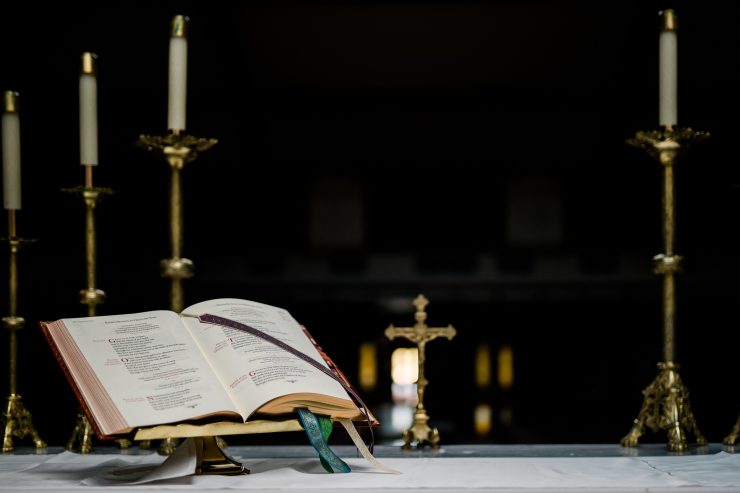As Catholics, we are occasionally criticized for our ritual worship and rote prayers. While at times I do wish I was more poised when leading public impromptu prayers, I am grateful for the treasury of prayers at our fingertips. These prayers are far from lifeless. They come from our rich heritage—thousands of years of holy men and women, from the writings and meditations of known and unknown saints.
The pleas of Blessed Herman the Cripple, calling out to our Mother of Mercy, our life of our sweetness and hope can draw us closer to our Mother. The wisdom of St. Thomas Aquinas praising the hidden God truly present underneath these veils can remind us of reality. The profound meditation of that unknown person who gave us the words to ask to be washed by the water from Christ’s side can hep us enter into the great mysteries. These prayers have been whispered by millions of souls across the world, and they bring the comfort of an old, reliable friend.
I like to use the prayers of the liturgy in my own private prayer for this same reason. I often speak to God from my heart, using my own feeble words. But I also love to use the liturgical prayers that are our law of belief. The words that the Church prays in Her liturgy give voice to what She believes.
Several years ago, I discovered in the liturgy a little prayer that the priest prays just after the Agnus Dei. He has two options, a longer prayer and a shorter prayer. While he prays one of them silently just before the minor elevation (“Behold the Lamb of God…”) I usually pray both of them just before going up for Communion.
Lord Jesus Christ, Son of the living God,
who, by the will of the Father
and the work of the Holy Spirit,
through your death gave life to the world,
free me by this, your most holy Body and Blood,
from all my sins and from every evil;
keep me always faithful to your commandments,
and never let me be parted from you.
Or:
May the receiving of your Body and Blood,
Lord Jesus Christ,
not bring me to judgment and condemnation,
but through your loving mercy
be for me protection in mind and body
and a healing remedy.
Who am I that God is willing to make himself so vulnerable? That he is willing to come to me, to enter into me, as food for my soul? Who am I that I walk up that aisle and wait for his visit? How can I dare to even approach?
There may be a danger dwelling in those thoughts if they result in scrupulosity. None of us are worthy to receive Him, none of us are worthy of the gift of Holy Communion. But if we do not have mortal sins on our soul and we are properly disposed, we can approach him, despite our unworthiness. Despite our daily struggles to love Him, despite those temptations we succumb to and those (venial) sins we commit, he wants us to approach the altar. He wants to come to us.
In fact, we have to be humble enough to recognize that those venial sins, those temptations, those struggles can only be conquered with his grace. And so we must come to him, as a sick person seeks medicine, as an invalid seeks a remedy.
If I’m ever tempted to doubt the Real Presence, it is not because I doubt His power, but because I know my unworthiness. But I believe, for the what God’s Son has told me, take for truth I do; Truth himself speaks truly or there’s nothing true (Adoro te devote, St. Thomas Aquinas). I am grateful I found those prayers in my daily Missal. I cling to them, letting the give me the words that I do not always have, and I approach with humility and faith. Never let me be parted from you… be for me protection in mind and body… May that flesh touch my tongue and not bring me condemnation, but healing…
Do not weigh my merits, Lord, but grant me your pardon (Roman Canon).













